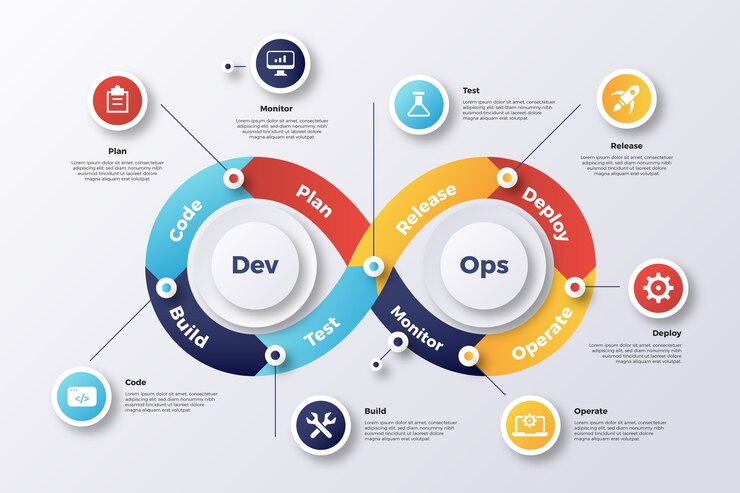Introduction
In today’s fast-paced digital landscape, businesses are constantly seeking ways to enhance efficiency, reduce time-to-market, and boost overall productivity. One powerful strategy that has been gaining momentum is the implementation of DevOps. But what exactly is DevOps, and why should your organization consider integrating it into your operations? This article will explore the myriad benefits of implementing DevOps and how it can transform your business operations.
What is DevOps?
Definition and Overview
DevOps is a set of practices that combines software development (Dev) and IT operations (Ops) with the goal of improving collaboration and productivity by automating infrastructure, automating workflows, and continuously measuring application performance. It emphasizes a culture of collaboration between development and operations teams to streamline processes and accelerate the delivery of high-quality software.
Core Principles of DevOps
- Collaboration: Breaking down silos between development and operations teams.
- Automation: Utilizing tools and processes to automate repetitive tasks.
- Continuous Improvement: Regularly assessing and improving workflows.
- Monitoring and Feedback: Implementing continuous monitoring and feedback loops to improve performance.
Why Implement DevOps in Business?
Increased Efficiency and Speed
One of the most significant benefits of implementing DevOps is the dramatic increase in efficiency and speed. By automating repetitive tasks and fostering collaboration, teams can deliver software updates faster and more reliably. This speed-to-market advantage allows businesses to respond quickly to customer needs and market changes.
Enhanced Quality and Reliability
With DevOps, the focus shifts to continuous testing and integration. Automated testing ensures that any code changes are immediately tested for quality, reducing the likelihood of bugs and issues in the final product. This proactive approach to quality assurance leads to more reliable software and a better user experience.
Cost Savings
Implementing DevOps can lead to substantial cost savings. By automating manual processes, businesses can reduce labor costs and minimize the risk of errors that can lead to costly fixes. Additionally, the efficient use of resources and improved operational efficiencies contribute to lower overall operational costs.
Improved Collaboration and Communication
DevOps promotes a culture of collaboration between development and operations teams. By breaking down traditional silos, teams work together more effectively, sharing knowledge and addressing issues collaboratively. This enhanced communication leads to more cohesive and efficient project execution.
Scalability and Flexibility
DevOps practices facilitate scalability and flexibility, allowing organizations to quickly adapt to changing demands. Automated infrastructure and continuous integration enable businesses to scale their applications efficiently and deploy updates with minimal disruption.
Key Benefits of Implementing DevOps in Business
Faster Time-to-Market
By streamlining development and deployment processes, DevOps enables faster delivery of new features and updates. This quicker time-to-market allows businesses to stay ahead of competitors and meet customer demands more effectively.
Increased Customer Satisfaction
The improved quality and reliability of software resulting from DevOps practices lead to higher customer satisfaction. Faster response times and fewer bugs contribute to a better user experience, fostering customer loyalty and positive feedback.
Enhanced Security
DevOps incorporates continuous security practices, such as automated vulnerability scans and compliance checks. This proactive approach helps identify and address security issues early in the development process, reducing the risk of data breaches and other security incidents.
Greater Operational Efficiency
Automated workflows and streamlined processes contribute to greater operational efficiency. DevOps practices minimize manual interventions and reduce the likelihood of errors, leading to smoother operations and more efficient use of resources.
Better Team Morale
The collaborative nature of DevOps fosters a positive work environment. Teams experience increased job satisfaction as they work together towards common goals and see the tangible results of their efforts. This improved morale can lead to higher employee retention rates and a more motivated workforce.
Challenges of Implementing DevOps
Cultural Resistance
One of the primary challenges organizations face when implementing DevOps is cultural resistance. Shifting to a DevOps mindset requires a change in how teams collaborate and communicate, which can be met with resistance from employees accustomed to traditional processes.
Tool Integration
Integrating various DevOps tools and technologies can be complex. Ensuring that different tools work seamlessly together requires careful planning and implementation to avoid compatibility issues and ensure a cohesive workflow.
Skill Gaps
Successful DevOps implementation often requires specialized skills and knowledge. Organizations may need to invest in training or hire new talent to fill skill gaps and ensure that their teams are equipped to handle DevOps practices effectively.
Steps to Implement DevOps in Your Organization
Assess Your Current Processes
Before implementing DevOps, assess your existing development and operations processes. Identify areas for improvement and determine how DevOps practices can address specific challenges and enhance efficiency.
Define Your Goals and Objectives
Clearly define your goals and objectives for adopting DevOps. Whether it’s faster time-to-market, improved quality, or cost savings, having a clear vision will guide your implementation strategy and help measure success.
Choose the Right Tools
Select the appropriate DevOps tools that align with your organization’s needs. Consider tools for continuous integration, automated testing, and infrastructure management to support your DevOps practices effectively.
Foster a Collaborative Culture
Encourage collaboration and communication between development and operations teams. Promote a culture of shared responsibility and transparency to ensure that all team members are working towards common goals.
Implement Automation
Automate repetitive tasks and processes to streamline workflows and reduce manual interventions. Focus on automating testing, deployment, and infrastructure management to achieve greater efficiency.
Monitor and Measure Performance
Continuously monitor and measure the performance of your DevOps practices. Use metrics and feedback to identify areas for improvement and make necessary adjustments to optimize your processes.
Provide Training and Support
Invest in training and support for your teams to ensure they are equipped with the knowledge and skills needed to implement and sustain DevOps practices effectively.
Conclusion
Implementing DevOps in your organization offers a multitude of benefits, from increased efficiency and speed to enhanced quality and customer satisfaction. By fostering collaboration, automating processes, and continuously improving workflows, businesses can achieve significant operational improvements and maintain a competitive edge. While there may be challenges along the way, the rewards of a successful DevOps implementation make it a worthwhile investment for organizations seeking to thrive in the digital age.
FAQs
- What is the primary goal of DevOps?
The primary goal of DevOps is to improve collaboration between development and operations teams, streamline workflows, and accelerate the delivery of high-quality software through automation and continuous improvement. - How does DevOps improve software quality?
DevOps improves software quality by incorporating continuous testing and integration practices, which help identify and address issues early in the development process, reducing the likelihood of bugs and performance issues in the final product. - What are some common tools used in DevOps?
Common DevOps tools include Jenkins for continuous integration, Docker for containerization, Kubernetes for orchestration, and Ansible for configuration management. These tools help automate various aspects of the development and deployment process. - What are the key challenges of implementing DevOps?
Key challenges of implementing DevOps include cultural resistance, tool integration issues, and skill gaps. Overcoming these challenges requires a strategic approach, clear communication, and ongoing training and support. - How can organizations measure the success of their DevOps implementation?
Organizations can measure the success of their DevOps implementation by tracking metrics such as deployment frequency, lead time for changes, mean time to recovery, and customer satisfaction. Regular feedback and performance reviews also help gauge the effectiveness of DevOps practices.





